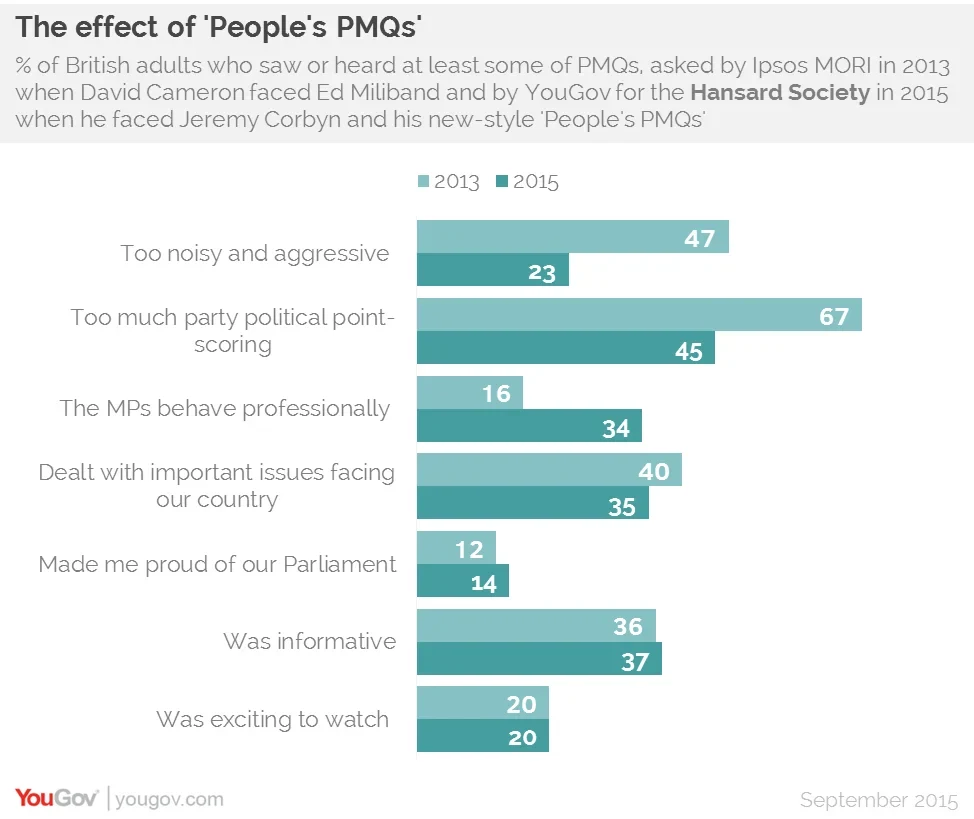There has been a marked improvement in attitudes to Prime Minister's Questions – but the real challenge is to combine light and heat, information and drama
The long haul starts this week. The dramas of the Labour and, for those who noticed, Liberal Democrat leadership campaigns are over; so are the party conferences. As Parliament returns, the summer sprints give way to the autumn and winter marathon. And one of the most intriguing questions is, what will happen in the coming months to Prime Minister’s Questions?
Four weeks ago, Jeremy Corbyn’s first encounter with David Cameron generated much comment, most of it favourable. Labour’s new leader raised the concerns of six specific voters, out of thousands who had emailed him. He forced the Prime Minister to give substantive answers. Corbyn resisted the knock-about tone that has characterised PMQs down the years and, effectively, made the Prime Minister also adopt a more serious tone.
In time we shall find out whether this will continue – or whether PMQs will revert to the kind of tribal confrontation that generates far more heat than light. To assess public attitudes, the Hansard Society commissioned YouGov to conduct a survey immediately after that first Corbyn-Cameron session. We repeated a series of questions that Ipsos-MORI asked in December 2013, when Cameron’s opponent was Ed Miliband.

Among those who said they had either watched the whole of PMQs, or seen news clips from it, we found a marked improvement in three respects, compared with two years ago:
- The proportion saying that week’s PMQs was ‘too noisy and aggressive’ halved from 47% to 23%
- The number saying ‘there was too much party political point-scoring instead of answering the question’ was down from 67% to 45%
- The proportion saying that ‘the MPs behave professionally’ doubled, from 16% to 34%
That’s the good news; however, in other respects, there has been little or no movement, with 37% saying it was informative (compared with 36% in 2013), 20% describing it as ‘exciting to watch’ (20% in 2013), and 14% saying ‘it made me proud of our Parliament’ (12% last time). The proportion saying ‘it dealt with the important issues facing the country’ was actually down, from 40% to 35%. This probably reflects Corbyn’s decision to concentrate on specific cases rather than large, fundamental issues.
The obvious conclusion is that Corbyn – and therefore Cameron – are on the right track. In three respects, public approval is up sharply; on the only one where the figures have gone backwards, the change is a modest five points. A sustained change to a more courteous and informative approach to PMQs would win public approval.
However, I wonder whether that would be enough. Four times a year, the Prime Minister faces precisely this kind of calmly-spoken scrutiny, with MPs from all parties asking him serious questions politely – and, indeed, asking follow-up questions to pin him down. These are when the PM appear before the Commons Liaison Committee – a committee of the senior MPs who chair each of the select committee. It is a tradition started by Tony Blair that Cameron has continued. They are shown live on the Parliament Channel and, sometimes on the BBC and Sky news channels.
Yet the audiences are small, the follow-up in the press, online blogs and TV news bulletins are usually minimal, and public impact almost certainly zero.
So: would a more polite PMQs, in which Cameron gives Corbyn proper answers to genuine questions, really do much good? I hope they would, but I’m not sure. I say this for two reasons. The first is that public disenchantment with PMQs over the years is one small part of a much bigger problem: voters’ disillusion with our elected representatives. Reviving public respect is a big, long-term challenge. To be sure, better behaviour at PMQs can help, but on its own it cannot be nearly enough.
Secondly, I fear that an excessively courteous PMQs would go the way of Liaison Committee meetings: civilised, but little noticed. The biggest single reason why PMQ attracts so much attention is that it is often dramatic. And it is usually dramatic precisely because it is raw and rumbustious – or, in the words of our question for the Hansard Society, ‘noisy and aggressive’.
Here, then, is the real challenge to Corbyn and Cameron. Can they provide both light AND heat? Can they combine information and drama? If they can, then a reformed approach to PMQs could play a real, if modest, part in reviving public faith in what goes on at Westminster. If not, then we will end up with either polite but little-noticed changes or – more likely, I fear – a return to the bad old days of shouted, bogus questions and shouted, bogus answers.
PA image









